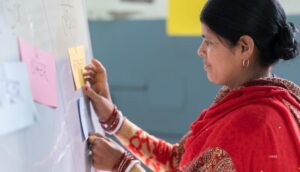The COVID-19 pandemic is imposing itself as the greatest crisis since the Great Depression. It is affecting – and revealing structural socio-economic weaknesses in – all regions of the world.
Responding to COVID-19 is not only a question of preparedness, it is fundamentally a question of peace and security, and of political and financial decisions that will have the capacity to address the broader socio-economic consequences of the pandemic as it continues to unfold.
As was the case with the response to HIV, COVID-19 is producing new opportunities for smart partnerships at scale and across sectors (see box below).
In only six months, the rapid spread of the COVID-19 pandemic has deeply damaged the existing social, economic and political structures across the globe. The speed and brutality of the phenomenon has caught all governments and institutions off guard. At the same time the pandemic has served as a powerful revelator of social and economic vulnerabilities in all countries.
While some progress was made in building a solid partnership agenda within the Aid Effectiveness Agenda, it must be recognized that this agenda has not produced the kinds of results that had been anticipated.
COVID-19 is indeed triggering commitments to respond efficiently and accelerate improvements in cooperation and partnership-building across sectors. Today, however, the institutional landscape has profoundly evolved with the United Nations (UN) and African institutions recognizing the growing role of the private sector, innovation and partnerships.
Lessons from HIV:
Twenty years ago, the international community orchestrated a full-fledged response to HIV/AIDS, realizing that it had become a threat to the peace and security of entire regions of the world and to decades of development gains.
In January 2000, the UN Security Council held its first meeting on HIV and Security. US Ambassador Richard Holbrooke worked closely with UN Secretary-General Kofi Annan to garner support for a call to action. This was a major turning point for making HIV treatments available in the Global South.
The UNSC meeting also triggered a series of further global events, including the G8 in Genoa in June 2001 where the Global Fund was established. These actions were the result of strong political consensus and leadership.
The private sector played a central role in establishing the governance of the Global Fund and defining the partnership modalities in support of grant implementation. The operational partnership model coined as ‘co-investment’ produced a broad range of innovative partnerships by which private players accepted the basic principles in support of national priorities and plans as well as transparency and accountability.
PEPFAR was also an early endorser of this approach. The co-investment model was flexible enough to produce the beginnings of cross-sector partnerships linking health to Agriculture, Food Security and Nutrition. COVID-19 is an opportunity to put co-investment to work again.
Africa-driven strategies and partnerships – an opportunity to deliver smart solutions at scale
Health systems in Africa have benefited from sustained investments from governments, GFATM, PEPFAR and many other sources committed to specific diseases as well as health systems strengthening. But on the aggregate these systems remain weak.
Plans to fight COVID-19 are emerging from organizations across the planet. It will be important to analyze those proposals that will be the most strategic in supporting the goals of African governments and institutions working closely with the World Health Organization (WHO) and UN.
The African Union (AU), the United Nations Economic Commission for Africa (ECA) and the African Development Bank (AfDB) have come forward with strong commitments.
WHO has engaged forcefully with the private sector, together with the World Economic Forum (WEF), to structure a strong private partnership track supporting a Covid Action Platform. In parallel the IMF, World Bank (WB) and major players such as the European Commission have put forward ambitious plans to tackle the health and socio-economic consequences of COVID-19 and the need to focus support towards Africa across strategic sectors.
Digital innovations and data systems at scale will support the Health / Nutrition / Agriculture / Resilience nexus
While interventions to build the direct response to COVID-19 are already at play, the need to address broader challenges related to food security, nutrition and climate change has been expressed forcefully. The World Food Program (WFP) has put forward strong messages concerning the rapid deterioration of food security indicators expected as a result of the pandemic. The Sahel is certainly the most vulnerable, currently facing the impacts of COVID-19, food security and climate risks together with political instability.
In the Sahel, the weakness of existing health systems combined with deeply underequipped systems for collecting and disseminating reliable weather and health data is creating the opportunity for leapfrogging progress in this digital/data field. Digital innovations and smart data systems have already been transforming health systems as well as other strategic sectors in African economies.
There is today a real opportunity to build an effective coalition with African institutions and governments together with financial and technical institutions, civil society, NGOs, farmers’ organizations and the private sector to support the scaling up of multipurpose data systems as a “Strategic Goal for Africa”. This could well be the second generation of ‘African Leapfrogging’ after the initial success with the use of cell phones.
This digital agenda has strong support from the UN, African institutions and partners. This will be important in improving the delivery of services as well as the de-risking of strategic sectors. It will also be creating jobs that meet the aspirations of African youth.
Time to support smart partnerships across sectors
There will also be an opportunity for deploying a new generation of co-investment partnerships at the local level, seeking benefits for employees and broader communities, in addition to cross-sector and cross-border partnerships.
Aliko Dangote put forward the right vision when he announced the launch of the African Business Coalition for Heath (ABCHealth), an African-led coalition of companies and philanthropists committed to improve the health and wellbeing of Africans. The coalition’s goals are to develop and scale impactful health programs across Africa, deepening knowledge, building evidence for future investment and strengthening coordination among African philanthropists, business leaders, companies and local business networks.
“It’s an ambitious and bold project,” said Mr. Dangote, “but the only way to move Africa forward is to take bold moves, to think big, dream big and do big things together – breaking down silos, working across borders and working across sectors – with government and with each other.”
Addressing the challenges of COVID-19 will be extraordinarily complex but it is also an opportunity to apply practical solutions that have worked, and to make best use of innovations and new partnerships with the private sector and civil society organizations.
Promisingly, recent mobilization of the G7 and G20 member countries as well as policy proposals from the IMF, WB, AU and ECA make it clear that strong support to African health systems must be accompanied by commensurate measures mitigating economic recession, support to the most vulnerable and continued investments in addressing job creation, food security, nutrition and climate change.
Partnerships with the private sector, and the modernization of systems such as multi-purpose data hubs, will be key to creating jobs that fit the aspirations and capacities of African youth. While the WEF is calling for a great reset, our good intentions will be put to the test in how we support Africa in leaping forward with smart solutions and partnerships.
Innovation and smart partnerships across sectors at scale are the only way forward. Let’s not reinvent the wheel. We know what works.
Note about the author:
Over the past 10 years, Dr. Michel Lavollay, co-founder of PPP Europe, has been actively engaged in building partnerships on climate, smart agriculture, nutrition and health in Africa. Based in Brussels, he supports institutions, NGOs and private sector groups in their efforts to collaborate and develop local partnerships for the delivery of services and achievement of national development goals, and most recently has been supporting international efforts to fight COVID-19.
A French physician, Dr. Lavollay has participated in all major initiatives to tackle HIV. During his early career he worked in France with Doctors of the World, the French National AIDS Agency, WHO’s Global Program on AIDS, and then at UNDP where he dealt with the socio-economic aspects of HIV. While working with the French Embassy in Washington, he participated in the development of the Global Fund to Fight HIV/AIDS, TB and Malaria. Later, working at the Global Fund, Lavollay built up their PPP strategy working closely with Ambassador Richard Holbrooke, the first President and CEO of the Global Business Coalition on AIDS (now GBCHealth). Many innovative partnerships were created in this period in support of national plans in Africa and across the world, contributing to the success of the GFATM as well as PEPFAR. Many of the lessons learned then can be applied today.
This article was previously published on GBCHealth and is reproduced with permission










